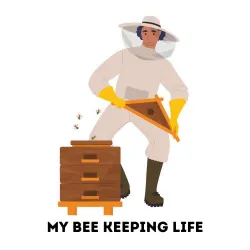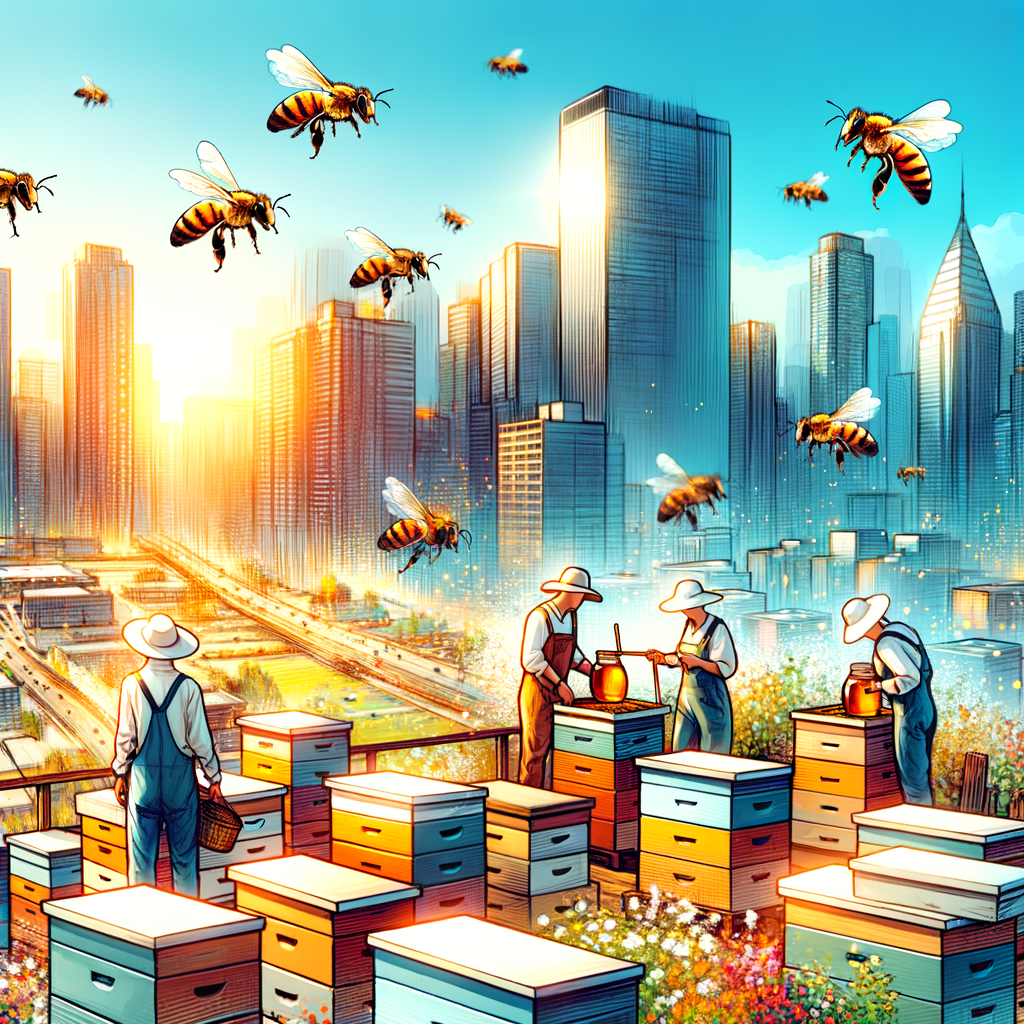
Introduction to Urban Beekeeping
Urban beekeeping, also known as urban apiculture, is a growing trend that is transforming cities and the way we think about the environment. This introductory section will help you understand the concept of urban beekeeping, explore its rise, and discover its role in honey production.
-
- Understanding the Concept of Urban Beekeeping
Urban beekeeping is the practice of keeping bee colonies in urban areas. This might seem surprising, but bees can actually thrive in cities. They find diverse food sources in gardens, parks, and balconies, and they contribute to urban biodiversity by pollinating plants. Urban beekeeping is not just about honey production; it’s also about creating healthier, more sustainable cities.
-
- Exploring the Rise of Urban Apiculture
The rise of urban apiculture is a response to several factors. First, there’s a growing awareness of the importance of bees for our ecosystem. Bees pollinate about one-third of the food we eat, but their populations are declining worldwide. Urban beekeeping can help boost their numbers. Second, urban beekeeping is part of a larger trend towards urban farming and sustainability. More and more city dwellers are growing their own food, and keeping bees is a natural extension of this trend.
-
- The Role of Urban Beekeeping in Honey Production
Urban beekeeping plays a significant role in honey production. City bees often produce more honey than their rural counterparts because they have a wider variety of plants to forage from. The honey they produce is also unique, reflecting the diverse flora of the city. Urban honey is a local product that connects city dwellers to their environment in a tangible way.
Urban beekeeping is a fascinating and important trend. It’s about more than just honey; it’s about sustainability, biodiversity, and reconnecting with nature, even in the heart of the city.
Urban Beekeeping and Mental Health
Urban beekeeping is not just about producing honey or helping the environment. It also has a significant impact on mental health. Let’s explore this connection further.
Exploring the Connection
There are two main areas where urban beekeeping can contribute to mental well-being:
-
- Understanding the therapeutic benefits of beekeeping
Beekeeping can be a therapeutic activity. It requires focus, patience, and a connection with nature, all of which can help to reduce stress and anxiety. The repetitive tasks involved in beekeeping, such as inspecting the hive and harvesting honey, can also provide a sense of calm and order, which is beneficial for mental health.
-
- How urban beekeeping contributes to mental well-being
Urban beekeeping can provide a sense of purpose and achievement, which is crucial for mental well-being. It can also help to foster a sense of community, as urban beekeepers often work together and share their experiences. This social aspect can help to combat feelings of isolation and loneliness, which are common issues in urban environments.
Indeed, urban beekeeping is not just a hobby or a way to help the environment. It’s also a powerful tool for improving mental health and well-being. So, if you’re looking for a new hobby that can also boost your mental health, why not give urban beekeeping a try?
Mental Health Benefits of Beekeeping
When we think of beekeeping, we often picture honey production and the preservation of our environment. However, the benefits of beekeeping extend beyond these areas. It also offers significant mental health benefits. Let’s explore these benefits in detail.
-
- Stress relief through beekeeping
Beekeeping is a calming, meditative practice that requires focus and patience. As you watch the bees busily buzzing around, you can feel your stress melt away. In fact, a 2018 study found that beekeepers have lower stress levels than the general population. Beekeeping allows you to connect with nature, even in an urban environment, which is known to reduce stress and promote relaxation.
-
- Beekeeping as a form of therapy
Beekeeping isn’t just a hobby; it’s also a form of therapy. Therapeutic beekeeping has been used to help people with mental health issues, including depression and anxiety. The routine of caring for the bees, the sense of accomplishment from harvesting honey, and the connection with nature can all contribute to improved mental health. As one beekeeper put it, “When I’m with my bees, all my worries and troubles seem to disappear.”
-
- Improving mental health with urban beekeeping
Urban beekeeping brings the benefits of beekeeping to city dwellers, who often lack access to nature. It can be a source of relaxation, a way to connect with the community, and a means of contributing to environmental sustainability. Urban beekeeping can also provide a sense of purpose and achievement, which are key to mental well-being. A 2019 survey found that urban beekeepers reported higher levels of happiness and lower levels of stress than non-beekeepers.
Beekeeping is more than just a pastime. It’s a powerful tool for improving mental health, providing stress relief, therapeutic benefits, and a sense of purpose. Whether you’re in the countryside or the heart of the city, beekeeping can help you find peace and happiness.
Case Studies: Urban Beekeeping for Mental Health
Urban beekeeping has been shown to have significant benefits for mental health. Let’s explore some real-life success stories that demonstrate the positive impact of this activity.
Success Stories
-
Case study 1: Urban beekeeping therapy in cities
In a bustling city, a group of individuals found solace in urban beekeeping. They started a project to introduce beekeeping in their community. The participants reported feeling more relaxed and focused after spending time tending to the bees. They also felt a sense of accomplishment from producing honey and contributing to the local ecosystem.
-
Case study 2: Mental well-being through beekeeping
In another case, a mental health clinic incorporated beekeeping into their therapy programs. Patients who participated in the beekeeping activities showed significant improvements in their mood and stress levels. The repetitive tasks involved in beekeeping, such as inspecting hives and harvesting honey, provided a calming effect and helped patients focus their minds, reducing feelings of anxiety and depression.
These cases highlight the potential of urban beekeeping as a therapeutic tool. It’s not just about producing honey; it’s about creating a healthier mind and a healthier community. As we continue to explore the benefits of urban beekeeping, we can hope to see more success stories like these in the future.
Getting Started with Urban Beekeeping
Urban beekeeping is a fascinating hobby that not only helps the environment but can also be a source of relaxation and mental health benefits. It’s an activity that requires knowledge, dedication, and the right tools. Here are some steps to help you get started on your urban beekeeping journey.
Steps to Start Your Own Urban Beekeeping
-
- Understanding the basics of beekeeping
Beekeeping is not just about collecting honey. It’s about understanding the life cycle of bees, their behavior, and their needs. Bees are social insects that live in colonies. The queen, the only fertile female, lays all the eggs. The worker bees, which are infertile females, do all the work like cleaning, feeding the young, and collecting nectar. The male bees, or drones, have only one job: to mate with the queen. Understanding these basics will help you manage your hive effectively.
-
- Choosing the right equipment for urban beekeeping
The basic equipment for beekeeping includes a hive, a bee suit, a smoker, and a hive tool. The hive is the house where your bees will live. It should be sturdy, well-ventilated, and easy to inspect. The bee suit protects you from bee stings. The smoker is used to calm the bees when you inspect the hive. The hive tool is a multipurpose tool used for opening the hive, separating the frames, and scraping off excess wax or propolis.
-
- Learning about urban honey production
Honey production in an urban setting can be a rewarding experience. Bees collect nectar from flowers and bring it back to the hive. Here, worker bees transform the nectar into honey by evaporating most of the water from it. Once the honey is ready, the bees seal the honeycomb cells with wax. As a beekeeper, your job is to harvest the honey without harming the bees or disrupting their activities. It’s important to leave enough honey for the bees to survive the winter.
Urban beekeeping can be a rewarding hobby that not only produces delicious honey but also helps the environment by supporting pollination. It’s a hobby that requires patience, dedication, and a willingness to learn. But with the right knowledge and tools, anyone can become a successful urban beekeeper.
Challenges and Solutions in Urban Beekeeping
Urban beekeeping is a rewarding hobby that can also contribute positively to the environment. However, it comes with its own set of challenges. Let’s explore some of the common hurdles that urban beekeepers face and how to overcome them.
Common Challenges in Urban Beekeeping
-
- Space constraints in the city:
Urban areas often lack the expansive green spaces that bees need to thrive. High-rise buildings, busy streets, and small backyards can make it difficult to find a suitable place for a beehive.
-
- Legal restrictions and permissions:
Depending on the city, there might be legal restrictions on beekeeping. Some cities require permits, while others might have strict rules about the location and size of the hives. It’s important to understand and comply with these regulations to avoid fines or other legal issues.
Overcoming these challenges may seem daunting, but with the right strategies and resources, it’s entirely possible to establish a thriving urban beekeeping practice. In the next section, we will discuss some solutions and tips for successful urban beekeeping.
Solutions and Tips for Successful Urban Beekeeping
Urban beekeeping may seem challenging, but with the right strategies and knowledge, it can be a rewarding experience. Here are some solutions and tips to help you succeed in urban beekeeping.
-
- Optimizing space for beekeeping in the city
Space is a premium in the city. However, bees don’t need a lot of it. They can thrive in a small area as long as they have access to flowers for nectar and pollen. Here are some tips to optimize space for beekeeping:
-
-
- Use vertical space: Install hives on rooftops or balconies. Bees can fly up to 5 miles for food, so height is not an issue.
- Choose compact hives: There are many types of hives available. Some, like the vertical top-bar or Warre hives, are designed to maximize space.
- Plant a bee garden: If you have a small yard, consider planting flowers that attract bees. This will provide them with a food source close to home.
- Navigating legal aspects of urban apiculture
-
Urban beekeeping laws vary by city and state. It’s essential to understand and comply with these laws to avoid penalties. Here are some general tips:
-
- Check local ordinances: Some cities require permits for beekeeping. Others limit the number of hives you can have. Make sure to check your local laws before getting started.
- Join a beekeeping association: Local beekeeping associations are a great resource for information on laws and regulations. They can also provide support and advice.
- Be a good neighbor: Bees can be a nuisance if not managed properly. Make sure your bees have a clean water source so they don’t visit the neighbor’s pool. Also, position your hives so that bees fly upwards and away from people and pets.
Urban beekeeping can be a fulfilling hobby that benefits the environment and improves mental health. With careful planning and a willingness to learn, anyone can become a successful urban beekeeper.
Conclusion: The Future of Urban Beekeeping for Mental Health
As we conclude, let’s take a look at the promising future of urban beekeeping and its potential to improve mental health. We will also discuss the trends that are likely to shape this field in the coming years.
-
- The potential of urban beekeeping for mental health
Urban beekeeping has shown immense potential in promoting mental health. The practice of beekeeping encourages mindfulness, a state of active, open attention to the present. This mindfulness helps reduce stress and anxiety, leading to improved mental health. It also fosters a sense of community, as beekeepers often work together and share experiences, further contributing to mental well-being. This potential of urban beekeeping is only beginning to be tapped, and we can expect to see more research and initiatives in this area in the future.
-
- Future trends in urban beekeeping and mental health
As awareness about the benefits of urban beekeeping for mental health grows, we can expect to see several trends emerging. Firstly, more cities may start to adopt policies that encourage urban beekeeping. Secondly, mental health professionals may start to incorporate beekeeping activities into their treatment plans. Lastly, we may see more community-based beekeeping projects aimed at promoting mental health. These trends suggest a bright future for urban beekeeping as a tool for improving mental health.
Lastly, the future of urban beekeeping for mental health looks promising. As more people become aware of the benefits of this practice, it’s likely that we’ll see an increase in urban beekeeping initiatives. So, whether you’re interested in beekeeping for its mental health benefits, or simply for the joy of it, there’s never been a better time to get involved.








